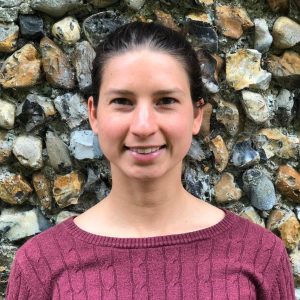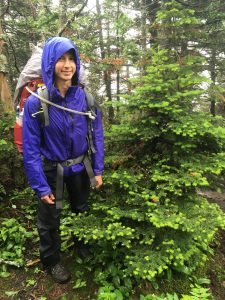 “My brother thought I’d like to code but I didn’t want to listen to him,” says Zena Lapp, our newest computational postdoctoral research associate. Famous last words!
“My brother thought I’d like to code but I didn’t want to listen to him,” says Zena Lapp, our newest computational postdoctoral research associate. Famous last words!
Zena joins us from the University of Michigan where she finished up her studies in Bioinformatics and Statistics. Even though she just got to Durham this past August, it seems like she’s been a part of the team for ages. She jumped right into the Once Bitten project and has started sharing some of her initial analyses at group meetings. Listening to her present her colorful, well-thought out figures, you would never guess that she didn’t always know that she wanted to pursue a career in malaria genomics research.
 Zena grew up in Pittsburgh. Her father was a doctor and throughout her childhood, her entire family packed their bags and accompanied him on medical trips to South and Central America. These experiences were incredibly formative for Zena, whose family members all speak Spanish to varying degrees as a result. So it was only natural when she graduated from undergrad that she decided to take a gap year in Bolivia working with Nuestros Pequeños Hermanos, the same organization her father had volunteered for. As is requisite while taking a gap year, Zena was using the year to think about what she wanted to do for the rest of her life. In the meantime, she was volunteering at a children’s home, coordinating volunteers and managing the organization’s donation website. But as the year went on, she felt like she needed a little more intellectual stimulation. It was then that she realized that maybe she should have listened to her little brother’s advice after all.
Zena grew up in Pittsburgh. Her father was a doctor and throughout her childhood, her entire family packed their bags and accompanied him on medical trips to South and Central America. These experiences were incredibly formative for Zena, whose family members all speak Spanish to varying degrees as a result. So it was only natural when she graduated from undergrad that she decided to take a gap year in Bolivia working with Nuestros Pequeños Hermanos, the same organization her father had volunteered for. As is requisite while taking a gap year, Zena was using the year to think about what she wanted to do for the rest of her life. In the meantime, she was volunteering at a children’s home, coordinating volunteers and managing the organization’s donation website. But as the year went on, she felt like she needed a little more intellectual stimulation. It was then that she realized that maybe she should have listened to her little brother’s advice after all.
“I had a computer and internet access.” And so, she started to teach herself how to code.
She started learning Python with Codecademy. Upon her return to the US, she sat in on some computational biology and bioinformatics classes at the University of Pittsburgh. It was then that she found her calling! She combined her undergrad experience in biochemistry and molecular biology and coding, and decided to apply to PhD programs in bioinformatics. She never lost her passion for global health, and after completing her PhD where she worked in an infectious disease lab, she decided to pursue a postdoc in global infectious disease epidemiology, focused on using genetics/genomics to study transmission of ID. This ultimately brought her to the Malaria Collaboratory at Duke. But the rest is not history.
While Zena was studying for her PhD at Michigan, she and her friend Brooke Wolford decided to co-found a Girls Who Code chapter. During her undergraduate studies, Zena had avoided programming classes because she just had the idea in her mind that she would hate computers. Now, she was working with young girls to help inspire them to pursue careers in computer science by not only teaching them how to code, but also by exposing them to women working in the field. Every meeting started with a guest speaker who talked about her own career trajectory, many of them Zena’s fellow grad student friends as well as some women working in industry at places like Google. Her favorite part of Girls Who Code was seeing the girls become more confident and excited about their coding skills and projects, and she is super happy to see the next generation of board members continuing to inspire young women to code.
Leave a Reply